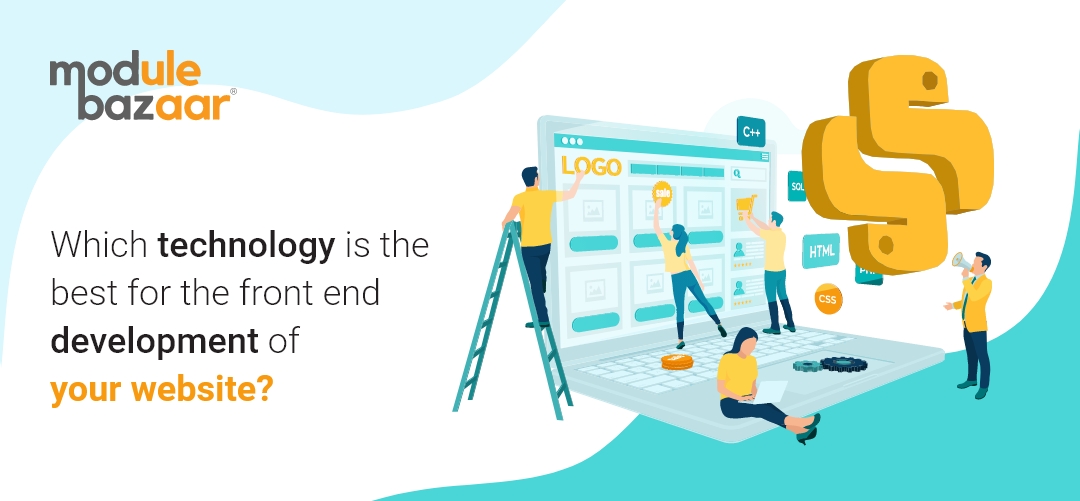Share the post "Which Technology Is The Best For The Front End Development Of Your Website?"
Front end development shapes the parts of your website that users interact with, so it’s crucial to use technologies that make it easy to create pages with a great user experience. Various web frameworks based on languages like Python and JavaScript are dominant in web development, but which ones are the best for the average business looking to build or expand a large, complex website that receives its customers?
Needs of Frontend Development
Front-end development covers all areas of the site that users will interact with, while backend covers the parts of the site that the application functions, databases, processing user requests, and algorithms. Frontend development needs to support creating HTML, CSS, and JavaScript to automate the process of creating web pages according to a consistent theme. It needs to result in a seamless user experience where pages are linked consistently and content creators can create attractive, modern-looking content that runs fast and integrates with any external tools that the site uses.
Due to the increased emphasis on JavaScript for dynamic pages, JavaScript web frameworks are often used in frontend development. But Python web development is extremely popular as well due to its advantages in backend development, and it can offer solutions for the frontend as well.
The leading web frameworks
Web frameworks are the An August 2021 survey of web developers reveals that JavaScript-based web frameworks are some of the most common ones used, though Python frameworks are close behind. React.js is the top framework, used by 40%, followed by JQuery with 34%. The TypeScript-based Angular is also popular. The leading Python frameworks, Flask and Django, are used by 16% and 15% respectively. However, many developers find JavaScript difficult to use and slower compared to Python, causing these tools to grow in popularity. JavaScript frameworks like React function well for situations that require high levels of interactivity.
Frameworks can be server-side or client-side, which can correspond to the backend and frontend depending on whether the application runs on the user’s browser or on a server.
Read also:- How Python Integrates with other Technologies and Third-party Providers
Is a Python frontend possible?
Despite JavaScript’s popularity leading to widespread use of JS frameworks, Python for development companies is able to deliver great websites and apps from a frontend perspective as well as the backend. For instance, Brython is an implementation of Python in a browser, substituting it for JavaScript in the right circumstances so you can interact with DOM objects on web pages or web applications with Python while accessing JavaScript libraries and APIs.
It is also common to use Flask or Django in the backend while using React in the frontend. Since React is compact, popular, and easy to integrate, it can be combined with a Python backend for maximum control of the user interface.
An anvil is an approach for 100% Python web development that supports Python in the browser. You can use Python to modify UI elements. Functions can be added to call the server from the browser to avoid asynchronous responses that increase loading and instability on web pages. Anvil also has built-in user authentication, which can be hard to add manually.
Factors for choosing a web technology
As shown by the wide variety of options for technologies and frameworks, there is no right answer for everyone. Choosing a web technology will come down to what experience the web development company possesses and how difficult new technologies are to learn and adapt.
In frontend development, user experience always comes first. That usually means lots of testing and tweaking, so you should be able to manipulate design elements and make changes quickly. It also means that you need to be able to serve pages and resources so that they load rapidly. Scripts can be a major obstacle to loading since they can block loading or change the rendering of the page mid-load.
Frontends should incorporate frameworks and libraries that simplify the design process. The average developer is not a UI designer, but they can draw from the resources around them to make the front end of a website more pleasing to users. Originality is good, but familiarity will help users navigate new websites and stay longer, improving SEO.
JavaScript and Python web development can play major roles in the choice of a frontend. While businesses may make their choice based on the experience of their developers, costs, and other factors, they should do research into a variety of options and remember that they aren’t limited to any one JavaScript or Python implementation.


